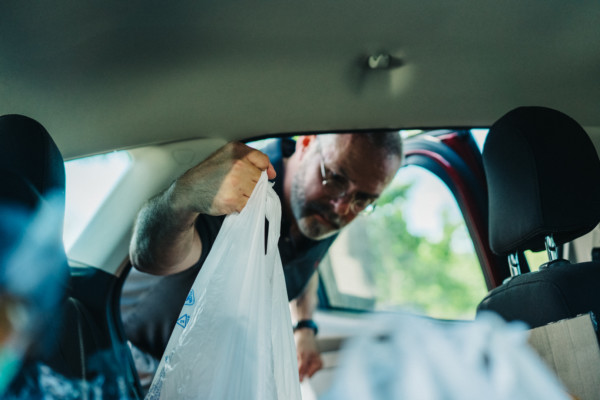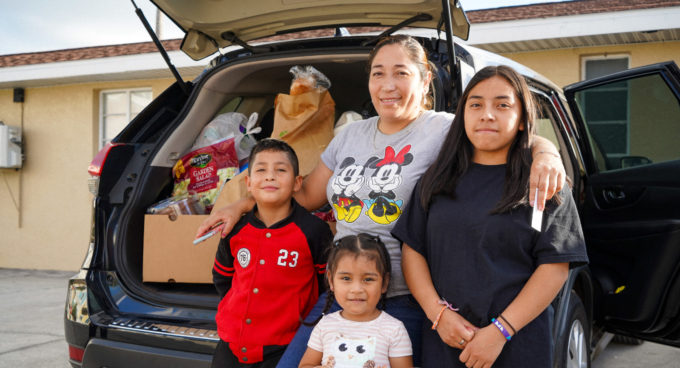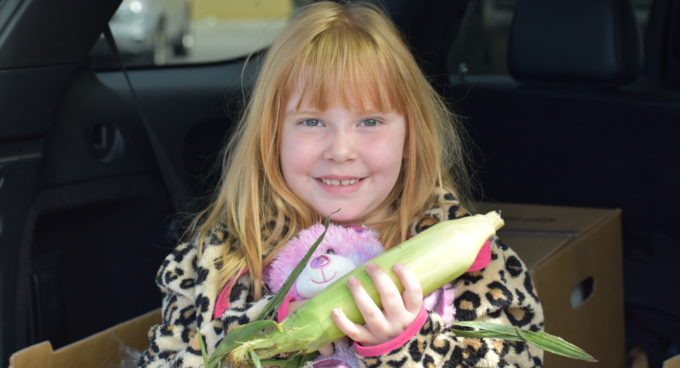 At Golden Harvest Food Bank in Georgia, food banker Amy Breitmann reflected on a food distribution: “Today was not a regular day. In addition to all the normal distributions we handed out 200 emergency food boxes. We turned away more than 100 cars.”
At Golden Harvest Food Bank in Georgia, food banker Amy Breitmann reflected on a food distribution: “Today was not a regular day. In addition to all the normal distributions we handed out 200 emergency food boxes. We turned away more than 100 cars.”
In the wake of schools closing, businesses shuttering, and entire cities shutting down due to COVID-19, Breitmann and the Golden Harvest Food Bank team had been working around the clock to obtain, package and deliver millions of pounds of food to their Georgia community. But their efforts still weren’t enough to help everyone who had waited to bring food home to their families.
While food banks will continue to serve at the frontlines to ensure no one goes hungry during these unsure times, COVID-19 has created a perfect storm that has made it difficult for food banks to keep up with mounting demand for food. From volunteer shortages to declining food donations, food banks are facing challenges that make it clear that we need more than food banks to help feed the nation during and after this crisis.
Food banks are struggling to keep up with increased demand for food assistance.
Feeding America’s 200 member food banks and 60,000 pantries and meal programs are facing what one food bank CEO “a tsunami of need.”
Prior to COVID-19, 40 million people in the U.S. were food insecure. Feeding America estimates that the novel coronavirus will result in 17.1 million additional people struggling against hunger – a 46 percent increase in people in need of food assistance. Feeding America is working nonstop to get food to as many people as possible, but even in normal times, food banks can’t reach every person who’s facing hunger.
Food banks are facing declining food donations.
Grocers typically donate one third of the food that food banks distribute. But amid the pandemic, with people panic buying shelf-stable food, grocers don’t have the surplus food they usually provide. A food bank CEO shared, “We’ve seen store donations from our grocery partners decrease over the past couple of weeks while we are trying to dramatically increase the amount of food we are distributing.”
Food banks also get food from federal programs, like The Emergency Food Assistance Program (TEFAP), the Commodity Supplemental Food Program (CSFP), and other commodities purchased by the U.S. government. During disasters, these programs are particularly important, but the government needs to get more food, and fast, to meet the need.
Food banks are seeing fewer and fewer volunteers.
Despite the increase in need, food banks are facing volunteer shortages. Many regular volunteers are over the age of 60 or have conditions that require them to stay home. Other business, religious and social groups have cancelled their organized volunteer shifts. In response, food banks across the country have called in the National Guard to pack food boxes, distribute food, and perform site assessments to stabilize need. Despite this critical help, many food banks are still severely understaffed.
Food banks need the support of the federal nutrition programs to meet growing need.
Food banks will remain open and provide as much help as they possibly can during this time. However, they need food, funding, and flexibility to do that work. And they can’t do it alone – they’re calling on government to step in and support people already and newly facing hunger and poverty.
Right now, Feeding America is urging Congress to raise Supplemental Nutrition Assistance Program (SNAP) benefits by 15 percent to help people who need food assistance put food on the table. SNAP already provides nine meals for every meal a Feeding food bank provides. Also, as the need grows, SNAP is designed to grow, too, to help people and the economy as a whole weather the economic shock that is sure to follow the coronavirus crisis.
From your own home, you can advocate for expanding SNAP benefits by contacting your representatives and urging them to do more ensure people have enough to eat during and after this public health emergency. Check out additional ways you can take action.



